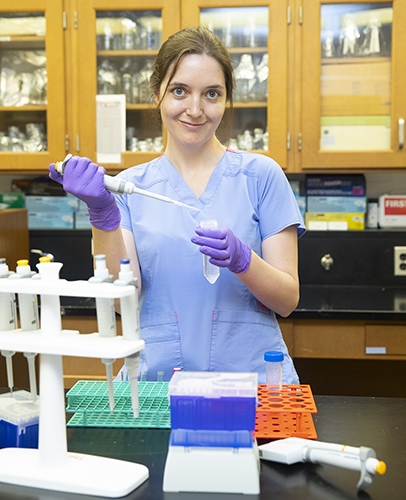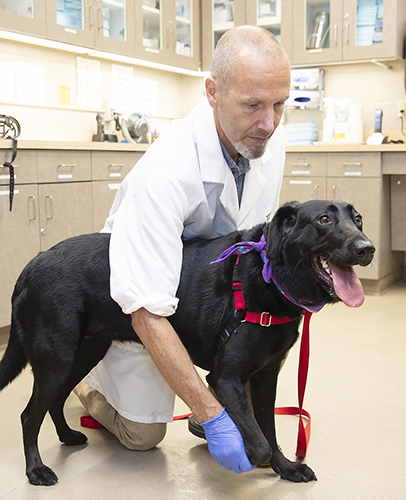CVM Faculty Members to Promote Canine Health with New Research Grants
Story by Megan Myers, CVMBS Communications
Drs. Nick and Unity Jeffery, a husband-and-wife duo at the Texas A&M College of Veterinary Medicine & Biomedical Sciences (CVM), have received canine health research grants from the American Kennel Club’s (AKC) Canine Health Foundation (CHF).

In celebration of its 25th anniversary, the AKC CHF awarded more than $2.1 million in 36 new canine health research grants in February. The selected projects were chosen based on their ability to meet the highest scientific standards and to have the greatest potential to advance the health of all dogs.
In her Dogs Helping Dogs Laboratory, Unity Jeffery, an assistant professor in the CVM’s Department of Veterinary Pathobiology (VTPB), will conduct research for her grant “Tumor-educated Platelets: A Minimally Invasive Liquid Biopsy for Early Cancer Diagnosis.”
Studies in human medicine have shown that RNA in blood platelets is a promising marker for various types of cancer.
Unity Jeffery’s study, in collaboration with Drs. Emma Warry, Jonathan Lidbury, and Chris Dolan, from the CVM’s Department of Small Animal Clinical Sciences (VSCS), will act as a proof of principle to determine if this information is translational into canine medicine.
If so, her research may be the first step in developing a blood-based screening test or liquid biopsy for canine cancer.
“One of the big problems with cancer in dogs is that because dogs can’t talk, they can’t let us know when they’re starting to feel just a little bit unwell or show very mild symptoms,” she said. “That means that we often don’t diagnose cancer in dogs until very late, when the cancer’s already widespread throughout the body.”
By using a test that can detect cancer earlier, veterinarians may be able to use more targeted treatment protocols that have reduced side effects.
“The hope of early diagnosis is that maybe that’s your chance to fully eliminate the cancer rather than just prolong life,” she said.

Meanwhile, CVM professor and neurologist Nick Jeffery will be working to extend results from a previous research project for his grant “Clinical Trial of Prevotella histicola Supplementation to Ameliorate Meningoencephalomyelitis of Unknown Origin (MUO).”
In a previous project, Nick Jeffery found that dogs with MUO, a disease of the central nervous system that resembles multiple sclerosis in humans, have an unusual balance of bacteria in their guts. Particularly, one bacteria that is known for controlling inflammation was consistently at lower levels.
His project will focus on providing supplements of that reduced bacteria to dogs with MUO to hopefully improve the disease’s outcome.
“We’re going to culture the bacteria and then put them into capsules that dogs can take every day,” he said. “The idea is that it will help us get better control of the disease, which is quite serious and quite a lot of dogs will die of it. We’re hoping that by supplementing with this bacteria, we might improve their survival.”
In addition to improving the survival of dogs with MUO, the bacterial supplement could also provide a way to reduce the use of immunosuppressive drugs, improving the dogs’ overall health and wellbeing.
Similar to the translational aspect of Unity Jeffery’s project, Nick’s may also one day play a role in human medicine by suggesting a new treatment method for multiple sclerosis.
“I was very pleased to get the grant, especially since it was a follow up on a previous study,” he said. “It’s fantastic to try out bacterial supplementation. This sort of approach is pretty new in all medicine, so it’s a great opportunity to test the idea and also try to fix dogs that have got a very serious condition.”
“I’m very grateful to the AKC Canine Health Foundation and the owners and breeders who donate to the charity,” Unity Jeffery said. “My Dogs Helping Dogs Lab, where we use canine patients and healthy volunteers to try to better diagnose and treat common canine diseases, fits really nicely with the AKC’s mission to improve the health of both pedigree dogs and the whole canine population. It’s a charity that I feel very honored to be funded by and very grateful for their continuing support.
“Nick and I have pet dogs at home and we love our dogs; they’re our family,” she said. “For me, I feel that I do the same type of research for my patients as a human doctor would do for theirs, and that’s what’s great about working in a veterinary school and having the opportunity to obtain funding from sources like the AKC.”
About the AKC CHF
Since 1995, the AKC Canine Health Foundation has leveraged the power of science to address the health needs of all dogs. With more than $56 million in funding to date, the AKC Foundation provides research grants for the highest quality canine health research and shares information on the discoveries that help prevent, treat and cure canine diseases. The Foundation meets and exceeds industry standards for fiscal responsibility, as demonstrated by their highest four-star Charity Navigator rating and GuideStar Platinum Seal of Transparency. Learn more at www.akcchf.org.
###
For more information about the Texas A&M College of Veterinary Medicine & Biomedical Sciences, please visit our website at vetmed.tamu.edu or join us on Facebook, Instagram, and Twitter.
Contact Information: Jennifer Gauntt, Director of Communications, Texas A&M College of Veterinary Medicine & Biomedical Sciences; jgauntt@cvm.tamu.edu; 979-862-4216


